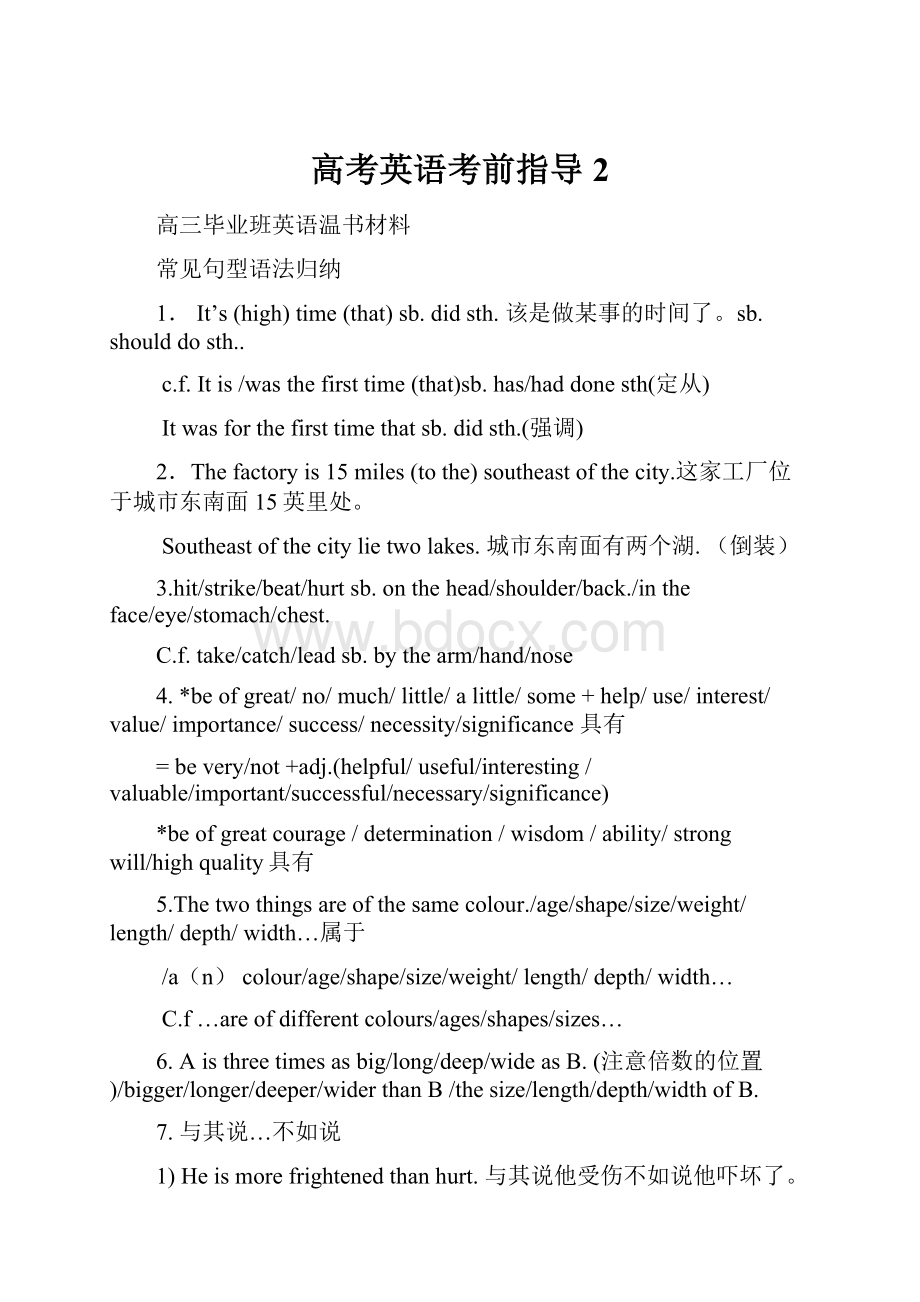高考英语考前指导2.docx
《高考英语考前指导2.docx》由会员分享,可在线阅读,更多相关《高考英语考前指导2.docx(14页珍藏版)》请在冰豆网上搜索。

高考英语考前指导2
高三毕业班英语温书材料
常见句型语法归纳
1.It’s(high)time(that)sb.didsth.该是做某事的时间了。
sb.shoulddosth..
c.f.Itis/wasthefirsttime(that)sb.has/haddonesth(定从)
Itwasforthefirsttimethatsb.didsth.(强调)
2.Thefactoryis15miles(tothe)southeastofthecity.这家工厂位于城市东南面15英里处。
Southeastofthecitylietwolakes.城市东南面有两个湖.(倒装)
3.hit/strike/beat/hurtsb.onthehead/shoulder/back./intheface/eye/stomach/chest.
C.f.take/catch/leadsb.bythearm/hand/nose
4.*beofgreat/no/much/little/alittle/some+help/use/interest/value/importance/success/necessity/significance具有
=bevery/not+adj.(helpful/useful/interesting/valuable/important/successful/necessary/significance)
*beofgreatcourage/determination/wisdom/ability/strongwill/highquality具有
5.Thetwothingsareofthesamecolour./age/shape/size/weight/length/depth/width…属于
/a(n)colour/age/shape/size/weight/length/depth/width…
C.f…areofdifferentcolours/ages/shapes/sizes…
6.Aisthreetimesasbig/long/deep/wideasB.(注意倍数的位置)/bigger/longer/deeper/widerthanB/thesize/length/depth/widthofB.
7.与其说…不如说
1)Heismorefrightenedthanhurt.与其说他受伤不如说他吓坏了。
Heismorecleverthanbrave.注意不能说成Heisclevererthanbraver。
2)Heisn’tsomuchillasdepressed.=He’sdepressedratherthanill.
与其说他病了不如说他很使沮丧。
8.Aisnobetter/moreinterestingthanB=Aisasbad/dullasB与…一样的不…
c.f.Aisnotbetter/moreinterestingthanB.A不如B好/有趣
9.cannot+比较级(含有最高级的意思)
Ican’tagreemore.我非常同意.Itcouldn’tbeworse.非常糟糕.
Youcouldn’thavechosenabettergiftforme.你给我挑了一个极好的礼物.
10.cannot/neverbetoocareful越细心越好/canneverthankhimenough万分感激
11..AisasgoodastudentasB.(注意这4个句型中adj.和a的顺序)
Itistoodifficultajobtodo.
Heissogoodastudentthatwelikehim.
Howfineadayitis!
12.*wouldratherdoAthandoB=prefertodoAratherthandoB=woulddoAratherrhandoB
*wouldrathersbdid/haddonesth.
13.Sb.hasdifficultyindoingsth./withsth./Thereissomedifficultyindoingsth.(注意difficulty为不可数=trouble)c.f.meetwithalotofdifficulties
14.DoyoumindifIdo…?
/WouldyoumindifIdid?
/
Do/Wouldyoumind(my)doing?
—Certainlynot./Ofcoursenot./I’msorrybutIdo./Youhadbetternot.
15.It’s(just)likesb.todosth.某人恰恰就是。
。
。
这个样子。
16.apartfrom除了…以外(=except(for);besides注意except不能放句首,但apartfrom则可)
AllthechildrenlikemusicapartfromBobby.(=except)
除了博比外所有的孩子都喜欢音乐。
Apartfrombeingtoolarge,thetrousersdon'tsuitme.(不可用except;=besides)
这条裤子不但太大,而且我穿着也不合适。
Apartfromafewwords,IdonotknowanyFrenchatall.(不可用except)
除了很少的几句外,我对法语一无所知。
17.注意以下几个Itis…的句型
Itwasnotlongbeforehecameback.过不了多久他就回来了。
(it指时间,后跟时间状从)
Itwas3yearsbeforehecameback.过了3年他才回来了。
(同上)
.Itis/hasbeenfiveyearssinceheleftFuzhou.他离开福州5年了。
(同上)
Itwasmidnight/2a.m.whenIgothereyesterday.(同上)
Itwasatfivethathecameback.(强调)
ItwasfiveyearsagothatheleftFuzhou.(强调句型)
18.Hewaswalkinginthestreetwhenheheardhisnamecalled.(when=andsuddenly)
Hehadjustlaindownwhentherewasaknockonthedoor.
Hewasgoingto/wasabouttoleavewhenitbegantopour.
19.Hedidn’trealizethathewastoocarelessuntilhefailed.
(强调)Itwasnotuntilhefailedthatherealizedthathewastoocareless.
c.f.(倒装)Notuntilhefaileddidherealizethathewastoocareless.
20.Ididnothingbutdosth/hadnothingtodobutdo
Icannot(choose/help)butdo不得不,只得
c.f.Ihadnochoicebuttodosth.
又:
WhatIwanttodois(to)haveagoodsleep.
21.Heisworkingharderandharderandheismakingmoreandmoreprogress.(越来越)
c.f.Theharderyouwork,themoreprogressyouwillmake.(越…就越…)
22.Doyouwantago?
=Doyouwantatry?
23..注意以下几个带it的句型
Ihate/likeitwhenpeoplespeakwiththeirmouthsfull.
Iwouldappreciateitifyoucandropinonusnowandthen.
Youmaydependonitthattheywillsupportyou.
I’llseetoitthateverythingisallright.
Don’ttakeitforgrantedthattheywillsupportyou.
Ifitisconvenienttoyou,…(×Ifyouareconvenient)
24.抽象名词具体化:
表”一种,一类,一份,一场,一阵,一件,一个”,前面往往有adj.修饰
agreatsuccess,abigfailure(指成功或失败的人和事),agreat/pleasantsurprise
agreatdisappointment,agreathelp好帮手,agreentea,aheavyrain,astrongwind
acoffee,abig/delicioussupper,agoodmemory,agoodknowledgeofEnglish
25.常用What来问的句型:
Whatisthepopulation/distance/attitude/price/address/height/depth/width/length/size?
26..插入语:
1)bytheway顺便说一下
ononehand,…onetheotherhand一方面,另一方面
foronething,…foranother(或also)
inshort,inbrief,inaword简言之
ingeneral一般说来
inaddition(to…),besides,apartfrom…此外
2)judgingfrom…根据…判断
generallyspeaking总的说来
talking/speakingof…谈到..
Considering…,taking…intoconsideration,Given…考虑到…
Allthingsconsidered,
supposing(suppose)…假如
eg:
Supposing(Suppose)/Ifitrained,wewouldstillgo.
3)totell(you)thetruth说实话
tobehonest(frank)老实说
tobesure无可否认,诚然
tobeexact确切说
tobeginwith首先
tomakethings/mattersworse使事情更糟糕的是
4)worsestill=what’sworse更糟糕的是
What’smore=besides况且
believeitornot信不信由你
27.常见不用被动的情况
1)sth.wash/cut/sell/readwell好洗,好切,畅销,读起来朗朗上口
burn/tear/breakeasily易燃/碎/破
writewell/smoothly好写
2)Thedoor/windowwon’topen/close.打不开/关不上
3)主语+need/want/require+doing=主语+need/want/require+tobedone
4)sth.+beworthdoing
5)主语(sth.)+feel/sound/taste/smell/look+表语(adj.)
6)主语+be+adj.(hard/easy/heavy/comfortable)+todo
7)sb.+betoblame某人应受到责备
8)sth.+runout=sb.runoutof/useupsth.
9)sb.giveout=sb.bewornout/tiredout
28.多个形容词排列的顺序:
限(定词)、数(词)、描(绘)+大(小)、形(状)、新(旧)、颜(色)+国(籍)、
材(料)、(用)途
abeautifullargenewredbrickdininghall一个漂亮的新的红砖砌成的大餐厅
语法要点归纳
I.定语从句:
1.只用that不用which:
先行词为:
最高级,序数词,不定代词,(all,much,little,no,nothing,anything,everything,alot,much等;先行词前有thevery,theonly,justthe修饰,先行词既指人又指物时。
2.只用which不用that:
介词后,非限制性定从中指物或代整句。
3.只用as不用that/which:
such/thesame…as搭配中;指代整句,有“正如“之意,常见asweknow/expect,可放句首(which不放句首。
)
4.用that/which还是用when/where:
主要看句子是否完整,有否缺主,宾,表。
有则用that,否则用when或where.
Thisisthefactorywhereheworks//(that/which)hevisited.
Itwasaterribleday(that/which)I’llneverforget.//whentheaccidenthappened.
5.that/which能否省:
在句中做宾语的可省。
但在介词后及非限制性定从中不能省。
II.名词性从句:
1.that的用法:
that在句中无词义。
不充当任何成分。
宾从中的that可省。
但以下两种情况不省:
Wethinkitimpossiblethathewillcomebackthisevening.(it做形式宾语)。
Hetoldme(that)hewouldcomebyairandthathewillarriveat10pm.(第二个宾从)
2.if与whether:
if只能放在宾语从句中。
而whether则可放在所有名词从句中。
Whether…or…还可引起让步状从。
4.what的使用:
首先要看句子是否完整,有否缺主,宾,表。
有则用what=theman/thingthat;whatever=anythingthat,可由此变换成定语从句。
Youcantakewhatyoulikebest.=Youcantakethethingthatyoulikebest.
Heisnotwhatheusedtobe.=Heisnotthemanthatheusedtobe.
5.语序:
名词性从句一律用陈述语序。
6.虚拟语气的使用:
在order,insist,suggest,propose,demand,require,request,advise引导的宾从中需用should或原形。
(但suggest表明、insist坚持认为则不)
在动词wish后根据时态需用三种形式:
did/were;haddone;would/coulddo.
在主从Itisimportant/necessary/strange/surprisingthatsb.shoulddosth.(或shouldhavedone)e.g.Itissurprisingthatheshouldhavefailed.注意虚拟语气的使用。
7.表从的两个句型:
Thereasonisthat……(注意不能说Thereasonisbecause…)
Heisill.It/This/Thatiswhyhecan’tcome.
c.f.Hecan’tcome.This/Thatisbecauseheisill.
8.同位语从句与定语从句的区别:
(要分清that的作用)
Thenews(that)hetolduswaswonderful定语从句(that做told的宾语)
Thenewsthathehadwonwaswonderful.同位语从句(that无意义,不可省)
III.情态动词:
1.表判断:
must,may,can
肯定句与否定句:
mustbe+表语(或doing)can’tbe+表语(或doing(现在)
musthavedone一定can’t(couldn’t)havedone不可能(过去/完成)}
may(not)do或be+表语也许(不)(现在)
may(not)havedone也许(不)(完成)
might(not)havedone也许(不)(过去)
疑问句:
(只能用can)
Canthenewsbetrue?
Whatcanhebedoing?
Whatcanhavehappenedtohim?
Whocanitbe?
CanitbeLiMingwhodidit?
(强调句型)
反意问句
Hemustbeastudent,isn’the?
Youmusthavedoneyourhomework,haven’tyou?
Youmusthaveseenthefilmlastnight,didn’tyou?
Hecan’thavegonetobed,hashe?
注意区别should与can:
Thereshouldbenoproblem.应该没问题。
Itcanbedangerous.这会是很危险的。
(表示客观、理论上的可能性。
)
2.虚拟:
A)从句:
主句:
Ifsb.did/were……,sth.would/could/mightdo….(现在)
Ifsb.haddone…..,sth.would/could/mighthavedone(过去)
Ifsb.did/were…sth.would/could/mightdo…(将来)
[shoulddo…
weretodo…
B)needn’thavedone本不必should(n’t)havedone本(不)该
[ought(n’t)tohavedone
plan/want/hope/mean/would(should)like(love)tohavedone本打算/想做某事
C)Ifonly+从句:
(虚拟语气)=HowIwish+从句;
Ifonlyhewerealive!
(现在虚拟)
IfonlyIhadpassedtheexam!
(过去虚拟)
IfonlyIcouldflytothemoonsomeday!
(将来虚拟)
D)butfor=ifitwerenot/hadn’tbeenfor要不是。
。
。
的话,(接虚拟语气的句子)
Butforyourhelp,Iwouldn’thavesucceeded.
D)asif…:
Hetalkedasifhekneweverything.但:
Itseems/looksasifheisill.(不要用虚拟)
3.shall与will
1)表示征求对方的意见:
ShallI/hedosth.?
(一、三人称问句)
Willyoudosth.?
(二人称问句)
2)表示意愿
will用于任何人称,表示主语的意愿)
I/We/You/He/She/Theywilldosth.
Shall用于二、三人称,表示说话人的意愿;含命令、警告与许诺
You/Heshalldoitwhetheryou/hewant(s)ornot.(命令)
Nothingshallstopus.任何东西都无法阻挡我们。
(决心)
YoushallhavethebookassoonasIfinishit.(许诺)
IV..不定式与动名词的区别:
1.主语:
Toseeistobelieve./Seeingisbelieving.
Itisimportanttodoit./Itisnouse/gooddoingsth.
Tom’sbeinglatemadetheteacherangry.
2.宾语:
以下动词常跟不定式做宾语:
agree,decide,expect,fail,hope,wish,learn,plan,promise,refuse,want,intend,pretend,manage,know(how),afford,wouldlike,usedto,ask,demand,choose,offer,seem,happen,appear
以下动词常跟动名词做宾语:
finish,enjoy,mind,practise,suggest,risk,advoid,escape,excuse,keep,miss,admit,allow,preventpermit,understand,giveup,imagine,appreciate,putoff,(beworth/bebusy+doing)
以下动词跟动名词或不定式做宾语都可